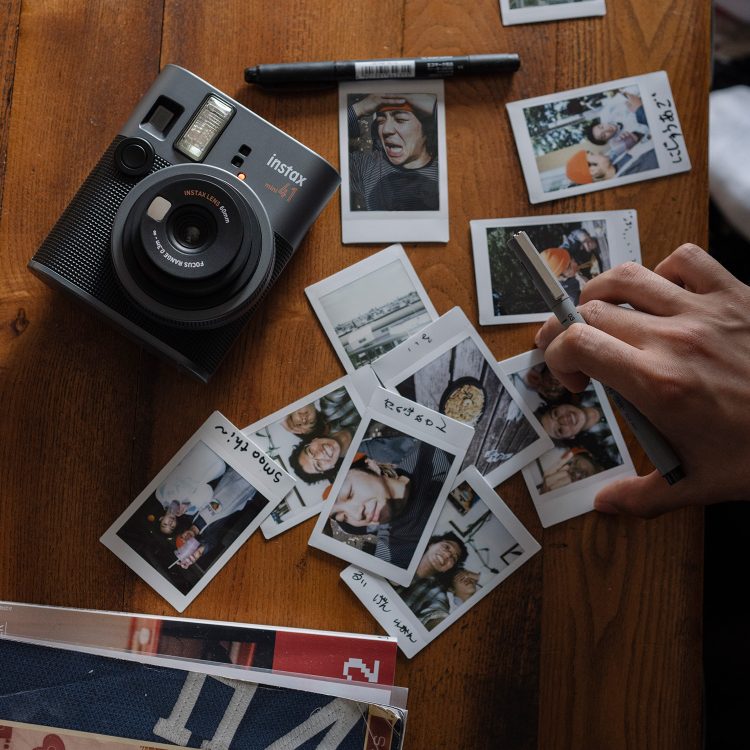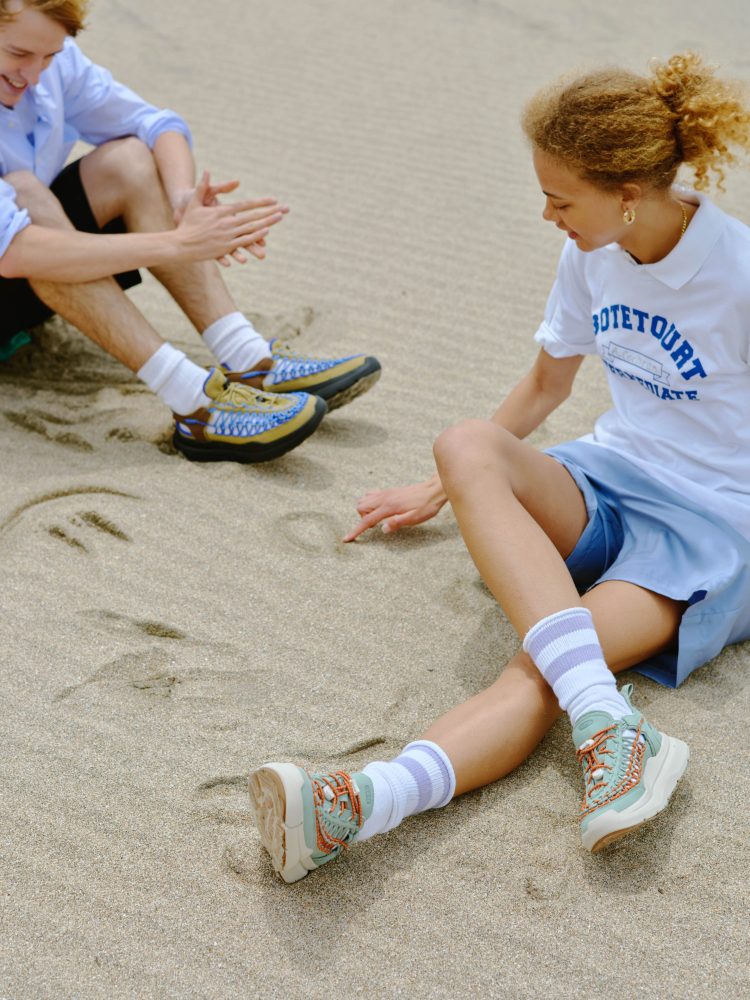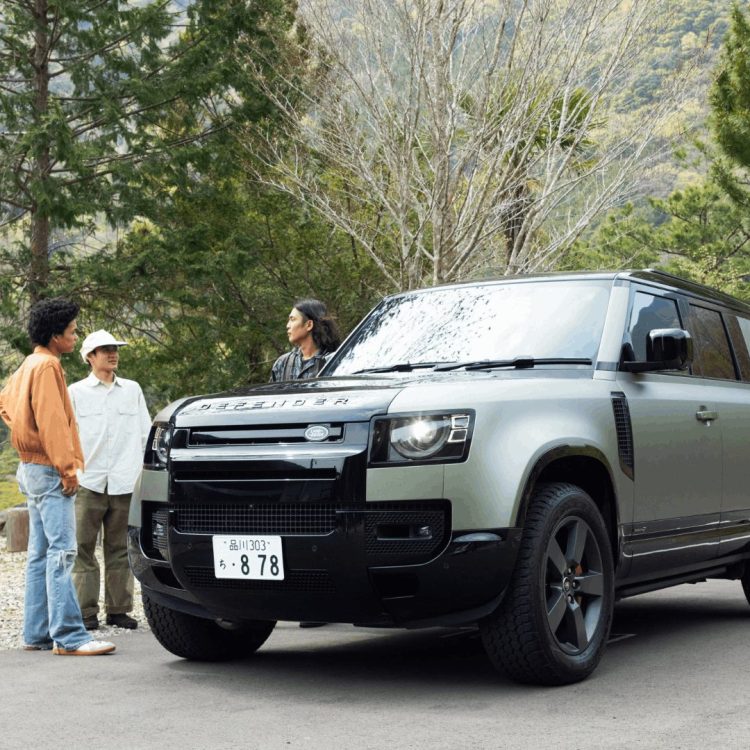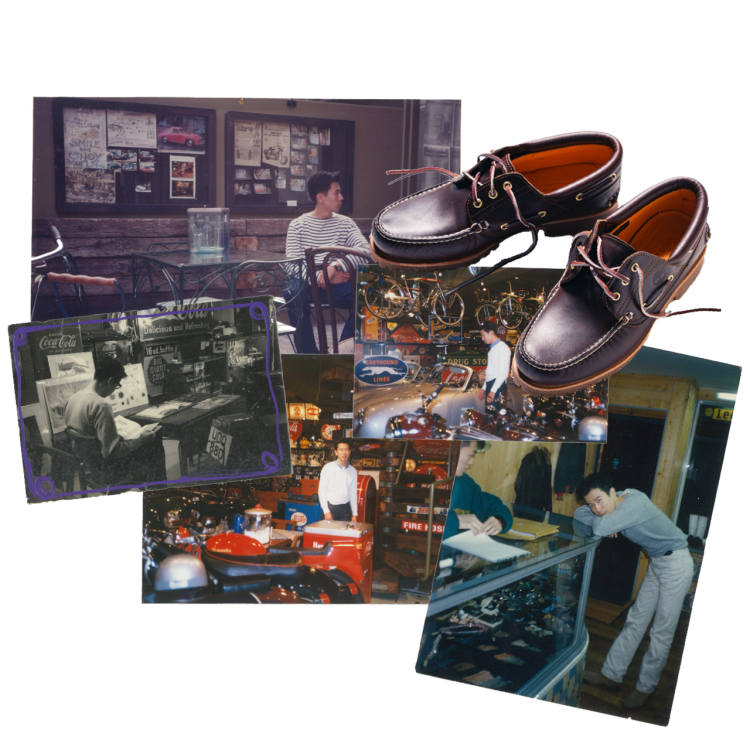カルチャー
50 Questions with Tadanori Yokoo
2021年5月31日
photo: Kazuharu Igarashi
text: Keisuke Kagiwada
translation: Catherine Lealand
2016年12月836号初出
Visiting the legendary graphic designer and artist’s atelier, we asked Tadanori Yokoo 50 questions- from his personal life to his involvement with Yellow Magic Orchestra.
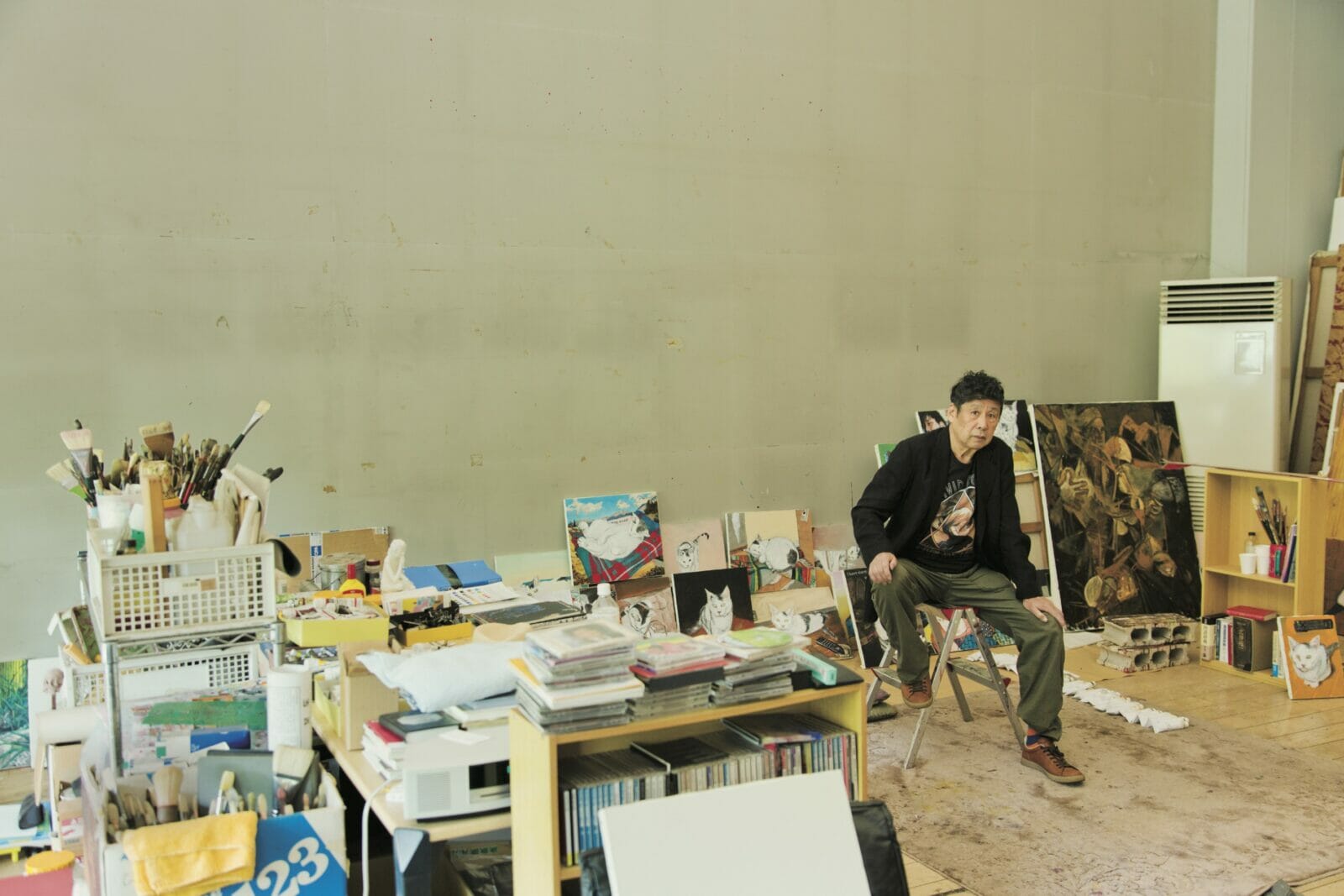
The handwritten answer below, and the final image, “Onko Chishin” (Learn from the past), were hand-penned by Yokoo himself.
01 What did you dream about last night?
I’ve forgotten.
02 What is your daily schedule like?
I go to bed at 9pm, and fall asleep at 10. Then, I wake up at 5. First, I work on developing my ideas and doing some writing, and from 8 I have breakfast. I come to the atelier around 10, seeing someone new for an interview or a meeting. I eat out for lunch. Then, I usually get to work in the afternoon.
03 What did you have for breakfast today?
My breakfast is always the same. A vegetable smoothie, bread, seasonal fruit, and some chai.
04 What kind of place do you go to for lunch?
There’s only about 2 places I go to. Chinese or soba. I’m trying to cut down on my salt intake, so I get them to make my meals with reduced salt.
05 What sport are you good at?
Currently there’s a ping-pong table in the basement of the studio and I’m using it to stretch, but I can’t say I’m any good at it.
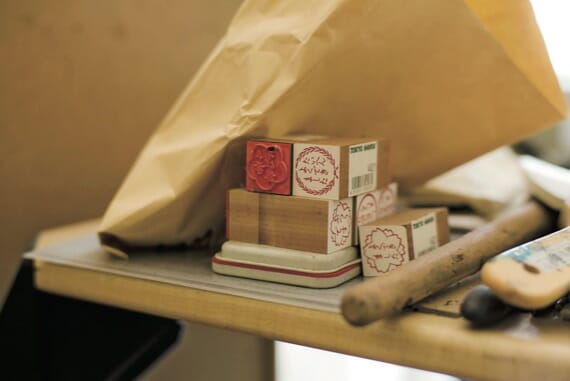
06 Are you particular about anything when it comes to your atelier?
I try not to be too particular about it. To be too particular about it is an obsession, and getting attached to things means you cannot break away from them. In conceptual art, a concept is created and one tries to become free within that concept. But I wanted to step out from that concept, which is why I left the atelier up to the architect, Arata Isozaki.
07 So, when it comes to fashion, you aren’t particular about anything either?
It’s all given to me. This David Bowie t-shirt, it was a birthday present from an acquaintance that works in a museum. You won’t become what you want to become. I want to become what I come to be. That’s also an aspect of painting. But as I am not a mere robot, rather a sentient cyborg, I need to combine the powers of others with that of my own.
08 What’s your earliest memory?
When I was 2, a large bridge in my hometown of Nishiwaki (Hyogo Prefecture) was washed away in a flood. I remember watching my father walking on the newly rebuilt bridge as I was carried on my mother’s back along the riverbank below. That’s my earliest memory.
09 What was the reason for your interest in art?
I was about 3 or 4. From a picture book, I copied a picture of Musashi Miyamoto (historical swordsman and philosopher). From that point on, I think I was an artist. I don’t think I would have become an artist without that moment. I was drawing before that point, but that’s the only picture I haven’t lost. I only have faint memories of the pictures I drew before that one.
10 What city is the most important to you?
The most import place has to be my hometown, Nishiwaki. But Tokyo and New York, which I visited often in the 1960s, are like second homes to me. I have strong memories of the all the places I’ve spent some time in, not just those places I’ve passed through.
11 What is Tokyo to you?
I’ve lived in Tokyo since 1960, so coming on 56 years, I think? It’s the place I’ve lived the longest. But I still feel like a foreigner to the place. I still can’t visit places like Aoyama or Roppongi because I feel like a country bumpkin. I can’t walk anywhere without bumping into everything. So I spend most of my time around my neighborhood, Seijo. Like a female cat, my territory is small. But this small territory is my world and my universe. I used to visit different places, but since thinking of myself as a cat, my territory has gotten smaller.
12 Is there anywhere you want to visit?
In time, I will die- at that point I’ll be able to visit places I’ve never been to! (Laughs)
13 Any books you’ve read recently?
I don’t read very much. As I wrote previously in my book, “Kotoba wo Hanareru” (lit. Leaving Words), the act of drawing a picture and the act of thinking in words are at odds with each other. So when I create my works, I build a blank world without worlds. Maybe it’s because of this my hearing has gotten so bad. (Laughs) The words are rebelling against me for rejecting them.
14 But you also write novels, right?
Well, I didn’t really write them because of my own desire to. I wrote my first novel because my acquaintance, who had recently become an editor for a literary publication, asked me to. I turned their request down, but after returning home, having dinner and settling down for bed, I had an urge to write something. That something ended up becoming a book. But it was just something I did between other projects, and I had no desire to pursue two occupations at once.
15 I get the impression you are closer to novelists rather than other artists- why is this?
I think that the “level” of artists is higher than that of novelists, and by talking to novelists I can confirm this. (Laughs) Yukio Mishima, despite being a literary figure, had a part of him that didn’t believe in words. “The Journal of Eugene Delacroix” was his favorite book, and I get the feeling Mishima too felt art was superior to literature. But then again, Mishima didn’t know anything about art, did he? (Laughs)
16 What was Mishima like?
I have trouble with abstract questions like that. I’m not sure how to describe him, but in part, he was like a teacher to me. He gave me a lot of suggestions. Not about art, but life advice. He once said to me, “Your work is said to be a reflection of the culture of your hometown. But that’s not true. It’s an expression of aversion to your own local culture. I’m the same. But you express this aversion as if it is spewing out of you. I show my aversion by not writing about it.” I felt as if he had described perfectly what I had failed to put into words at that time.
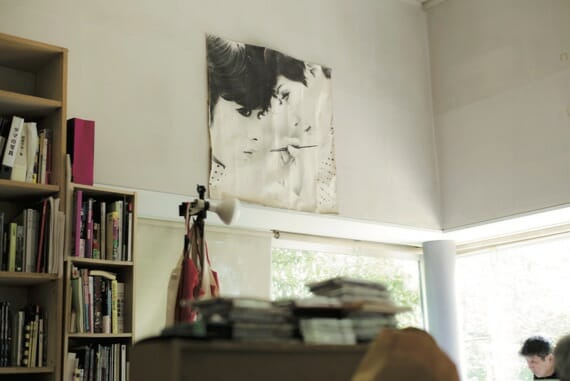
17 Do you still hold this distain towards your hometown?
Now, I am in my eighties and when the thought of where I should go next comes to mind, I find myself coming back to my origin, the place where I was born. It’s curious. My hometown is the inspiration for everything I create now. It’s like my hometown is being injected into me.
18 What does it mean to get older?
I suppose it is to awaken the young soul inside of me.
19 What’s the difference between children and adults?
Children retain the element of “play” in them. Adults have lost it. Children also are without purpose. Adults have a purpose that they work towards. I think I’d like to be an elderly infant.
20 What is the worse thing you’ve ever done?
Creating pictures perhaps. It reveals the opaquely bad part within me. It also reveals the inner evils of those who come into contact with it. This is also a good thing. Everyone thinks they are good, and I let them realise the reality. Whilst I think it might be a bad thing, it isn’t a crime! (Laughts)
21 What’s the best thing you’ve ever done?
Like I just said, creating my pictures. Well, perhaps I’ll do something good in the future. (Laughs)
22 Are you jinxed by anything?
Once every 10 years I am involved in a car accident. In 1960, 1970, 1980, 1990, and in the year 2000. And when this happens, I am admitted to hospital and have to take a break from my work, right? Because of this, the direction of my work changed. So I guess it’s a jinx.
23 What’s your personal motto?
I’ve never really thought about it. On my gravestone in my hometown, I’ve had the phrase “Onko Chishin” (Learn from the past)” engraved. That might be my motto.
24 Currently, do you have any ideas for a film?
When considering my body’s current conidition, I think a film would be difficult. There was a film that was going to be my first direction role. It was a documentary called “The Sea is Watching (Umi ga Miteita)”, orginally to be directed by Akira Kurosawa. After Kurosawa passed away, I was called on to be the director. I received other direction requests after that, but after not being able to create Kurosawa’s film, all the other films seemed dull.
25 If you could play any character in a film, who would you be?
Oh! This question made me remember my dream from last night! I dreamt I had to play the role of Osamu Dazai. But I don’t like Dazai! (Laughs) So, I said I would play the part if I could speak in a Kansai dialect, despite Dazai being from Tohoku.
26 What are your memories of “Diary of a Shinjuku Thief”?
Initially I thought I was in the running to win the Best New Actor Award. I mean, I might as well go for it. I was asked by director Nagisa Oshima who I would like to play opposite, and I mentioned the name of Ruriko Asaoka, whom I was a fan of at the time. I think he tried to convince her to take part, but I think she turned it down when she discovered there was an intense love scene with me (laughs).
27 What was Ken Takakura like?
Ken tried to unite his real life and the imaginary image of film into one. So, that’s why he was like how he was in films- a moral and honorable person. But, for me, that distance between the fake or imaginary image and my real self is where creation lies. If that distance is reduced down to nothing, I can’t create anything. That’s why Ken’s view of making things and my view of art are different.
28 What kind of person is Choji Yodogawa?
He’s kind, but behind his kindness he has a scary ability to see the true nature of others. That’s why I can’t lie in front of him. I can only show my honest self. And he does all this with a smile on his face.
29 Did you plan to join YMO (Yellow Magic Orchestra)?
I once went on a trip to India with Haruomi Hosono and on the way there, I kept going on about German rock. Whist he didn’t know much about German rock yet, he seemed interested and asked me to join (YMO). I thought I could design the stage sets and jackets, but when it came time to hold a press conference for YMO, I couldn’t attend. Just as I was getting ready on the day of the press conference, a strange journalist came to me, crying that if he didn’t hand in his article by the end of the day, he would be fired. So I found myself helping him write the article as the press conference began, and joining in halfway through wasn’t cool, so I had to pass. I had already got my hair cut into a ‘techno cut’ before everyone else, too! (laughs) If it hadn’t been for that editor, I would have joined YMO and gotten into a lot of trouble (laughs).
30 Do you go to karaoke?
The other day, I went with Shigesato Itoi. I only sing “Abashiri Bangaichi” and “Karajishi Botan,” but my hearing isn’t great, right? I can’t hear the sound. So I was probably off key.
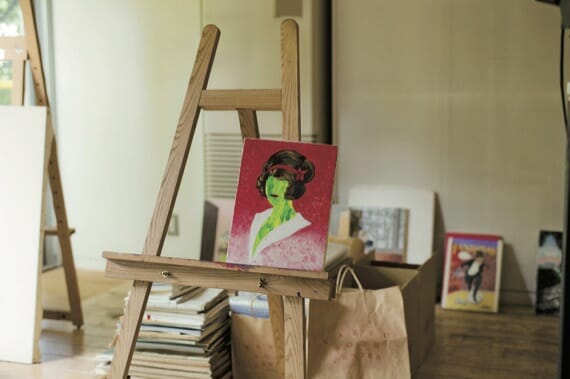
31 What is the difference between a graphic designer and an artist?
Graphics are work. Art is life.
32 What do you think of the graphics on the street?
It feels physical, right? It’s like expression through confronting the world directly. I think this physicality is one of the most important things that art has.
33 Is there anything that is off limits to you as an artist?
Nothing, I think. Otherwise one becomes conservative.
34 What’s your favorite color? Your least favorite?
I always think about this, but I love all colors.
35 Any artists you admire?
Duchamp, I think. Duchamp’s disreputability, his lack of sense (laughs). I also like Picasso, Chirico, and Picabia. These four.
36 Are you interested in any artists younger than yourself?
I don’t go to any exhibitions, so I wouldn’t really know.
37 Are there any young people, besides artists, that you are interested in?
Probably the only person is Ichiro (baseball player). He’s very self-disciplined, and stays levelheaded whether he’s winning or losing. The moment he wins, he’s no longer there. He’s in the next place. He embodies the spirit of the artist.
38 Does illness affect your work?
Yes. Literature is about working the mind. Ideas. But art is physical. So the body is very important. Art is about the body, isn’t it?
39 If you could curate an exhibition, without any restrictions, what works would you feature?
My five favorite people, Duchamp, Picasso, Chirico, Picabia, and myself. I would like to pair their works together with the works I have dedicated to them.
40 What is the relationship between art and religion?
It’s both connected and unconnected. My family’ s religion is the Kurozumi religion, which was founded by a man named Sochu Kurozumi, and I personally went to a Zen temple for a year to do Zen meditation. Both the morality and ethics that I learned from those experiences and my internal anti-morality and anti-ethics are attached to each other in my works.
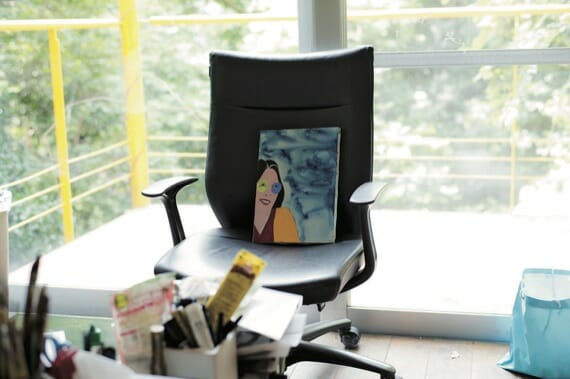
41 What is space to you?
I think that there are still many functions of human beings that have not yet been fully understood. Scientists think that our functions are connected to the earth, but the functions that have not yet been explained are connected to the universe. That’s why the universe comes into play when I think about things that have not yet been explained. The earth doesn’t matter yet. It’s only partially understood. Small things like deciding what to draw or deciding a theme are insignificant. I’m more interested in the kind of spirit that transcends human beings and unites with the universe. So I’m not interested in new styles or concepts.
42 What do you consider to be your masterpiece?
I think that’s for others to decide, not me. Every piece I work on is aiming to be a masterpiece, even if it ends up being unfinished.
43 Unfinished?
All of my works are unfinished. Completion doesn’t exist. We’re born unfinished, and our lives are spent trying to complete ourselves. I think everything we do in life in unfinished. Giving up and failing is okay. Obsessing over completion locks you in. Without an exit, it’s the end.
44 It there anything you’d like to try the future?
I don’t want to be challenged. I haven’t let out everything that’s inside me yet, and I want to bring it out. For that to happen, I need to look at the good and the bad in myself more.
45 What are your future aspirations?
Because of my age, things like ambitions, dreams, hopes, and other worldly interests slowly disappeared from my life. But there’s two ways of looking at it. There are two types of people: those who become more attached to such concepts as they get older, and those who move away. I think I’m the latter. When you’re young, it’s okay to have these kinds of things. But when you are fixated on them, you get tired of yourself. That’s when you want to throw it all away.
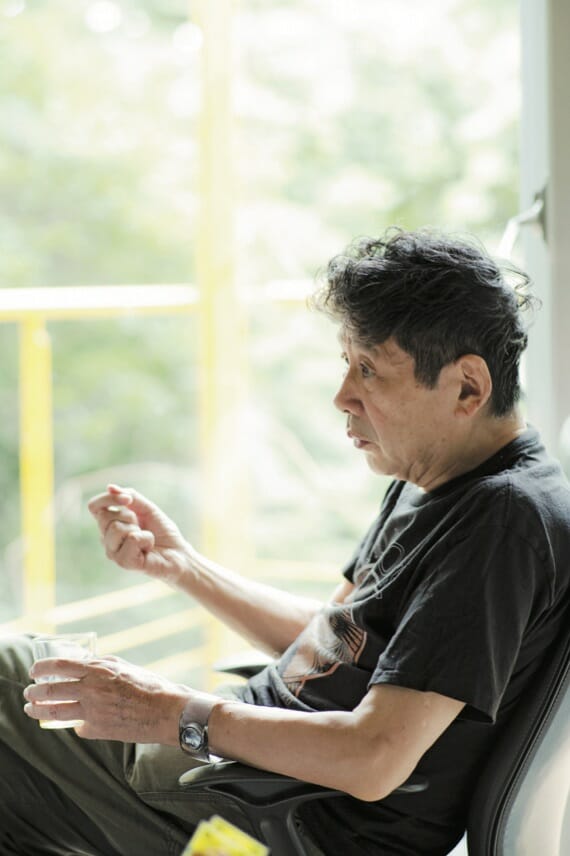
46 What would you do if you could travel back in time?
The fact that I’m talking so much about my past right now is already like time travel for me.
47 Is there anything from your past you want to erase?
Not at all. The past is positive for all.
48 Is making art fun?
When it comes to making art, I’m trying to throw away part of that ‘fun’. For example, trying to incorporate literary elements and creating a story. The process of making that kind of art is fun, but the finished piece is boring. This happens a lot. I’m not a writer, so I want to write grand stories in my novels. It’s fun because I can write them. In making art though, this kind of fun rarely exists. I don’t think that art should accept too many pleasures. For example, you have five senses. You enjoy it with your eyes. You enjoy it with your ears. Then it becomes a desire and an obsession. So you have to control it.
49 Is there pain in creation of your works?
You have to go through the pain to reach the pleasure of birth. There are times where the process is smooth from the beginning, but that’s not how it should be. The finished product is boring. It’s better to say, “I’m done! It’s better to say, “I quit! That’s why most of my favorite works are unfinished and I’ve given up on them.
50 What is art?
It’s a bit of a cliché, and I hate clichés, but it’s about how I live. So, if I’m doing art, that’s just how it is. I want to become what I come to be. That’s all I can do.
I always wanted to be a postman. But the principal told me to go to art school instead. Even though I didn’t want to go, I went through all the entry procedures and was forced to take the exam. That’s how I got where I am today. Everything happens the way it’s supposed to, thanks to external forces. You don’t need to make any extra effort.

PROFILE
Tadanori Yokoo
